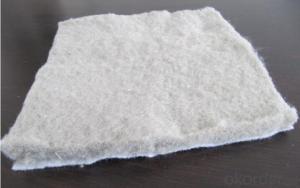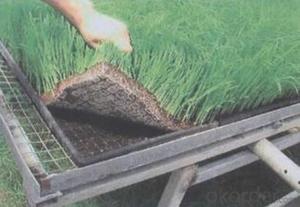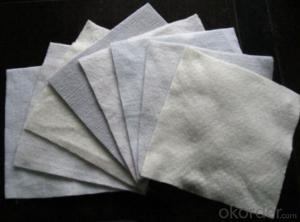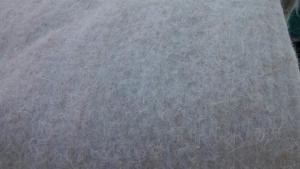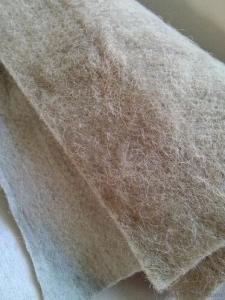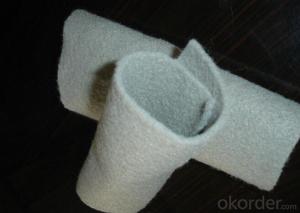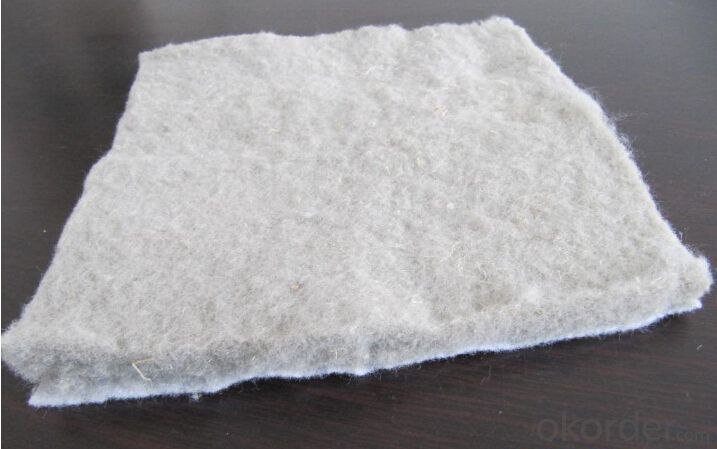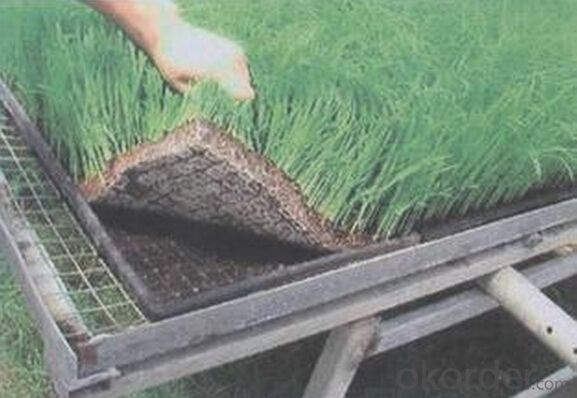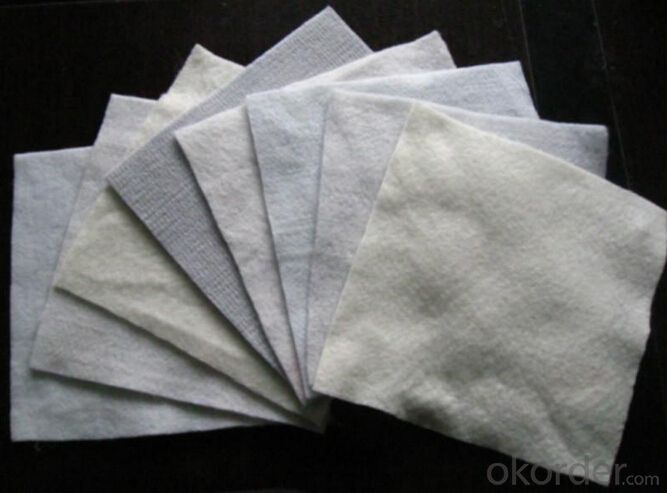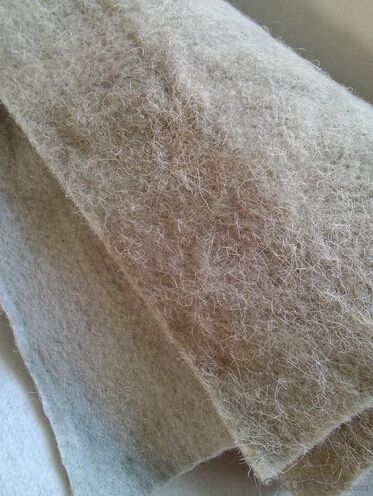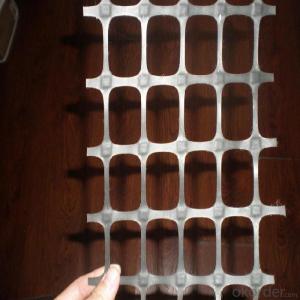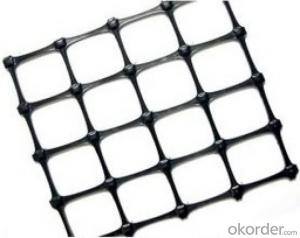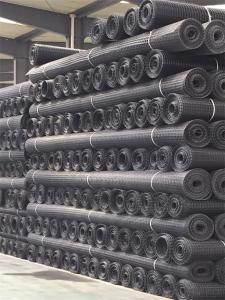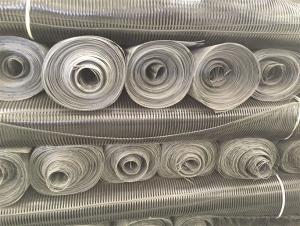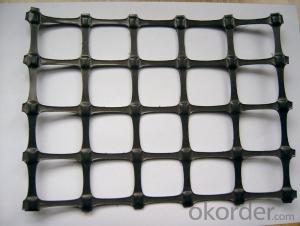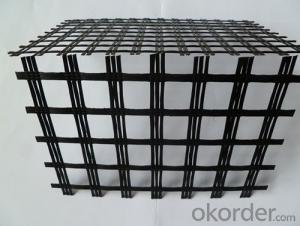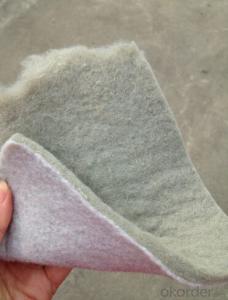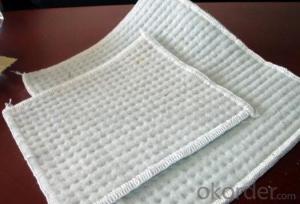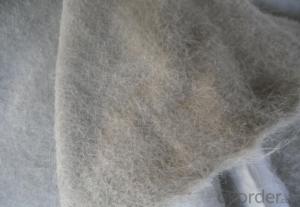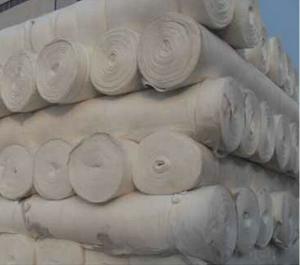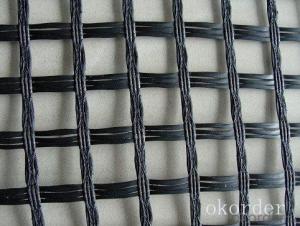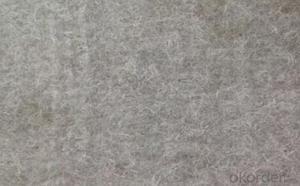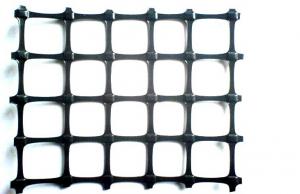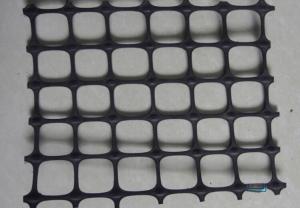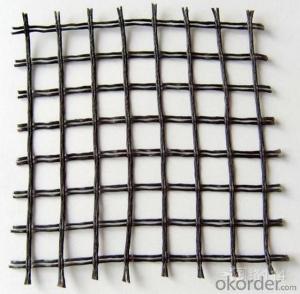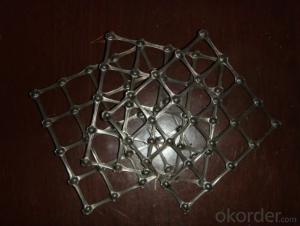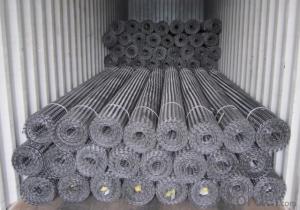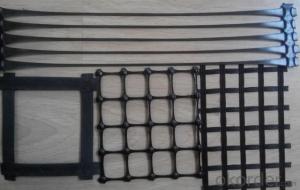Geogrids Philippines for Nutrition Geotextile Use in Ecological Slope Protection
- Loading Port:
- Qingdao
- Payment Terms:
- TT OR LC
- Min Order Qty:
- 5000 m²
- Supply Capability:
- 2000000 m²/month
OKorder Service Pledge
OKorder Financial Service
You Might Also Like
Nutrition geotextile in water environmental engineering .
Specification:
1. Bigger pore size between textiles,good adhesive ability of soil particle
2. The withstanding ability because of soft surface when ground deformation
3. Excellent drainage and protection ability
Product Feature:
1. Simple and fast construction
2. Achieve the greening effect quickly after construction
3. Due to the grass and composite fiber fabrics become into one integration, so it has the ability of certain degree of flow resistance for the water rising before the grass survive.
4. Composite fiber fabric is a continuous structure from slope top to slope toe, both ends are fixed, has high water flow resistance.
Technical Specification
5.0 m length and 1.05 m width. Reverse side all used filter material. Grass seeds: Bermuda grass (warm season grass), Bahia grass (warm season grass), Kentucky bluegrass (cold season grass), Tall fescue grass (cold season grass), Red fescue grass (cold season grass). Plant height: 0.1 ~ 0.5 m.
| NO. | Items | Specification | Notes | |||
| 1 | Total unit area weight g/sq.m | ≥380 | ||||
| 2 | dimension | width m | 1.0~2.0 | |||
| length m | as per user’s request | |||||
| 3 | Composite fiber fabrics | Material | Polyester Fiber | High strength PET | ||
| Unit area weight g/sq.m | ≥160 | |||||
| Mesh dimension mm | 8×8 | |||||
| Extension strengh kn/m | ≥11 | MD & CD | ||||
| 4 | Filtra layer | Material | Polyester non woven geotextile | |||
| Unit area weight g/sq.m | ≥40 | |||||
| 5 | Grass seeds, Fertilizer | Type | According to actual situation choose 3~5 grass seeds | |||
| Plant height m | 0.1~0.3 | |||||
| 6 | Fiber layer | Material | wood pulp cellulose | |||
| Unit areaweight g/sq.m | ≥15 | |||||
| 7 | flow resistance | ≥4 | not allow appear scour, suction and blanket turn-over etc. damage phenomenon | |||
| M/s | ||||||
| 8 | Anti-UV strengh conservation rate % | 65~80 | 3000hrs Continuously exposure 3000hrs | |||
| 9 | Supporting spare parts | ABS fastening nail | Material | ABS Resin | Fixed between two blankets by length direction | |
| Fiber diameter mm | 35 | |||||
| Nail length mm | 325 | |||||
| Lnail | Material | Steel wire (content 10% zinc-aluminium alloy) | Used to fix single blanket | |||
| Fiber diameter mm | 4 | |||||
| Nail length mm | 200 | |||||
| ABS connecting nail | Material | ABS Resin | Used in the slope between the two blankets ( width direction) | |||
| Nail length mm | 38 | |||||
| Connecting fiber | Material | High strength Polypropylene | Used in the slope between the two blankets ( width direction) | |||
| Length mm | Cut as per request | |||||
APPLICATION:
Generally laid on the river channel, slope protection etc. slope revetment projects, to control the water erosion, soil loss, meantime can reach the effect of slope ecological restoration and landscape greening, making river back to natural.
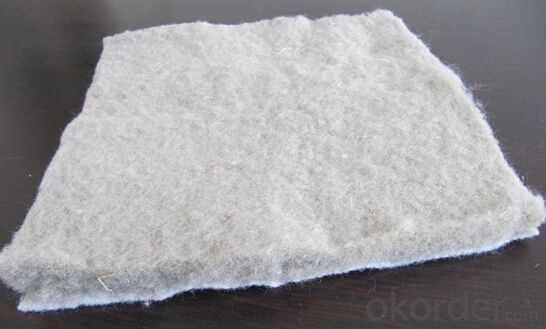
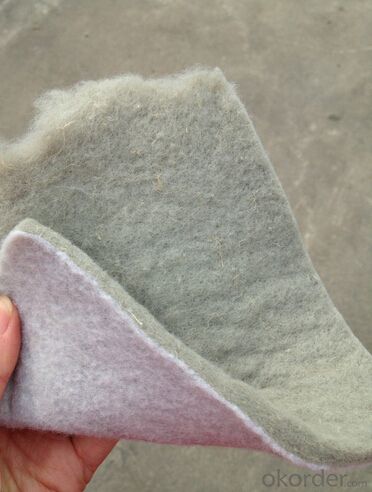
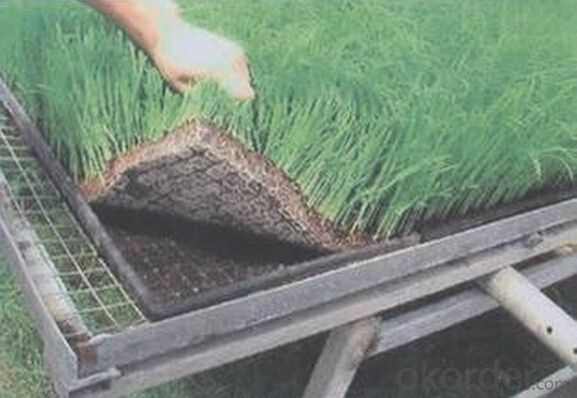
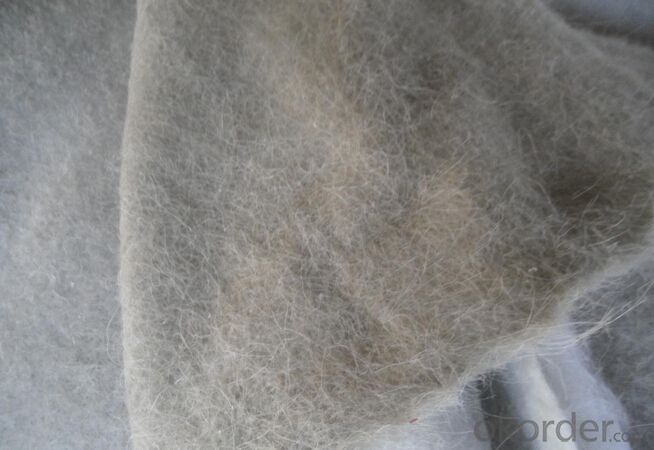
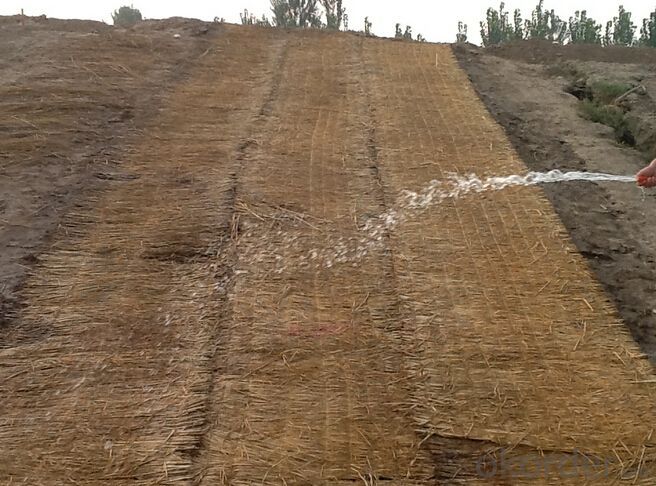
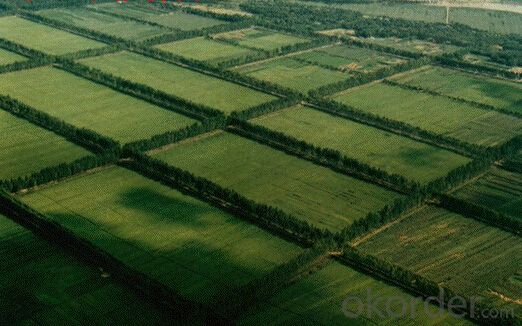
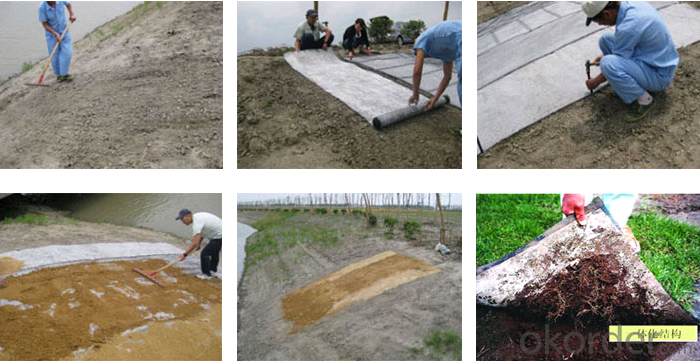
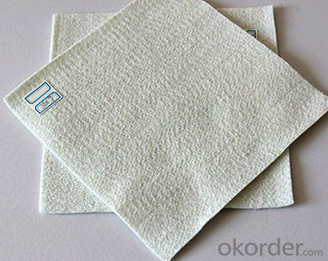
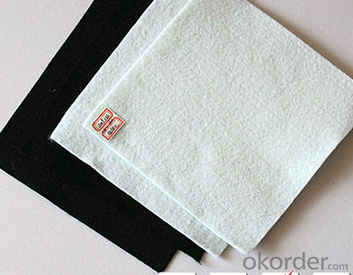
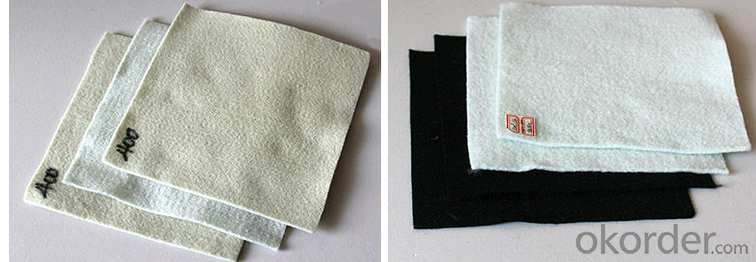
FAQ
1. How about the delivery time?
Lead time since receipt of 30% T/T deposit payment: 3 weeks.
2. What kind of payments does we support?
T/T, L/C, Cash are accepted.
3. What's are the MOQ?
We can according to your condition to set the MOQ.
And we can provide you samples for quality inspection.
4. How to deal with the sample charge?
Accordeing to our company policy, the samples are free, we only charge the freight fee.
And we will return the freight fee If you set the order .
5. Can you produce the product according to customers' requirements ?
Sure, we are professional manufacturer, OEM and ODM are both welcome.
6. Can you tell me your main customers?
That's our customers' privacy, we should protect their information.
At the same time, please rest assured that your information is also safe here.
- Q: What are the typical applications of geogrids in geotechnical engineering?
- Geogrids are commonly used in geotechnical engineering for various applications such as soil reinforcement, slope stabilization, retaining wall construction, and pavement reinforcement.
- Q: PVC HF what is the material PVCHF bidirectional geogrid is like?
- HF is a high stability of the metal, is generally used to prevent corrosion, and this kind of grid should be polyethylene two-way stretch plastic geogrid, flame retardant type
- Q: Can geogrids be used in underwater applications?
- Yes, geogrids can be used in underwater applications. They are often used to stabilize soil and prevent erosion in underwater environments such as riverbanks, shorelines, and underwater slopes. Geogrids are designed to withstand the hydraulic forces of water and provide long-term stability in these challenging conditions.
- Q: Can geogrids be used in soil reinforcement for oil and gas pipeline projects?
- Yes, geogrids can be used in soil reinforcement for oil and gas pipeline projects. Geogrids are commonly employed to enhance soil stability, prevent soil erosion, and improve load-bearing capacity in various construction applications, including pipeline projects. They provide reinforcement to the soil, reducing the risk of settlement and ensuring the long-term integrity of the pipeline infrastructure.
- Q: Can geogrids be used in reinforcement of mechanically stabilized slopes?
- Yes, geogrids can be used in the reinforcement of mechanically stabilized slopes. Geogrids are commonly used in slope stabilization projects as they provide high tensile strength and improve the stability and load-bearing capacity of the soil. They help distribute the load and reduce the potential for slope failure, making them an effective solution for reinforcing mechanically stabilized slopes.
- Q: What are the geogrid testing items
- The measured items are divided into the following aspects: the smoothness of the underlying layer and the degree of arch, the width of the lap, the stagger distance of the lapped seam, and the point of the joint
- Q: Geogrid and geotextile which effect is good
- The utility model is applied to the reinforcement of the railway subgrade, the maintenance of the road surface, the protection of the sports hall, the dam, the isolation of the hydraulic engineering, the excavation of the cave, the coastal beach, the reclamation, the environmental protection and the like.
- Q: GDZ150 type one-way steel plastic welding geogrid D in the construction of the roadbed is horizontal paving also vertical spread?
- The direction of the pulling force is consistent with the direction of the road extension
- Q: Can geogrids be used in reinforcement of underground storage tanks?
- Yes, geogrids can be used in the reinforcement of underground storage tanks. Geogrids are commonly used in soil stabilization and reinforcement applications, and they can provide additional support and enhance the structural integrity of underground storage tanks. They are typically installed around the tanks to distribute loads, reduce soil movement, and prevent potential damage or failure.
- Q: How do geogrids improve the performance of reinforced slopes?
- Geogrids enhance the performance of reinforced slopes by providing increased stability and strength. They act as a reinforcement layer within the soil, distributing loads more evenly and reducing the risk of slope failure or erosion. Geogrids also improve the soil's shear strength, preventing lateral movement and improving overall slope stability.
Send your message to us
Geogrids Philippines for Nutrition Geotextile Use in Ecological Slope Protection
- Loading Port:
- Qingdao
- Payment Terms:
- TT OR LC
- Min Order Qty:
- 5000 m²
- Supply Capability:
- 2000000 m²/month
OKorder Service Pledge
OKorder Financial Service
Similar products
Hot products
Hot Searches
Related keywords
